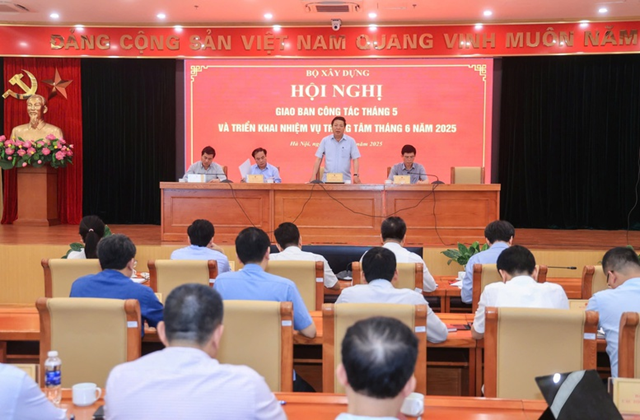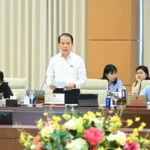At the May Conference and the Ministry of Construction’s deployment of tasks for June 2025 on June 6, Mr. Nguyen Tri Duc, Chief of Office, announced that the first review phase had been completed. Initial results showed that out of 447 business conditions, 174 (38%) were proposed for reduction, along with 278 administrative procedures (66%).
These reductions are estimated to shorten the processing time by nearly 1,200 days (out of a total of over 4,100 days) and save about VND 3,600 billion in compliance costs. The Ministry also plans to amend 32 legal documents, including seven laws, 27 decrees, and 15 circulars.
The units under the Ministry are finalizing the plan to streamline and simplify the procedures and will report to the Government before June 30, ensuring timely compliance with the Prime Minister’s requirements.

Image: Construction Ministry’s May Conference and June 2025 Task Deployment on June 6 – Photo: Construction Newspaper
|
Alongside procedural reforms, the Ministry of Construction is also promoting decentralization and delegation of power to local authorities. According to Ms. Tran Thi Minh Hien, head of the Ministry’s Institute of Legal Affairs, 118 out of 235 tasks are proposed to be transferred to local governments, accounting for over 50% of the tasks currently performed by the central government.
The delegation of power will provide local governments with more autonomy, reduce the burden on the central apparatus, and align with the two-tier administrative model. Two decrees on this matter have been finalized and are open for comments from local governments.
Minister of Construction Tran Hong Minh acknowledged the industry’s efforts in the first five months, especially the spirit of “doing and reviewing,” proactive administrative reform, and institutional building. The Minister shared that many nights, the office lights remained on as staff worked diligently to finalize comments on laws and documents.
Regarding crucial draft laws, Minister Tran Hong Minh urged for their swift completion, including the Law on Railways (amended), which needs to be submitted to the National Assembly at the 9th session. Furthermore, the units must clearly distinguish between procedures that need to be cut and content that needs to be simplified to create breakthroughs in administrative reforms in the construction industry.
– 07:00 08/06/2025
The Art of Governance: Navigating the Selection of Post-Merger Commune-Level People’s Committee Chairpersons
“The Ministry of Home Affairs prioritizes the selection and placement of individuals with exceptional leadership qualities and state management experience. We seek innovative and creative thinkers who are willing to take risks and embrace responsibility for the greater good.”
Unlocking Public Investment Capital: The Prime Minister’s Urgent Project Prodding
“There has been a notable improvement in the disbursement of public investment funds, and Deputy Minister of Finance Do Thanh Trung attributed this progress to the close attention and efforts of the Government. This proactive approach has played a pivotal role in expediting the process and ensuring efficient utilization of resources.”
The Big Apple Takes a Bite Out of Red Tape: Streamlining Construction with a Pilot Study
“The talented and esteemed Chairman of the People’s Committee of Ho Chi Minh City, Nguyen Van Duoc, has entrusted the Department of Construction with an innovative task. He has directed the department to explore a pilot program that would forgo the need for construction permits in areas with detailed planning or established road boundaries. This forward-thinking approach aims to streamline the construction process and promote efficient urban development in the vibrant city.”
“Minister of Home Affairs Addresses a ‘Very Special’ Development Phase in a New Era”
“Vietnam’s Minister of Home Affairs, Pham Thi Thanh Tra, underscores the nation’s stance at a pivotal juncture, ushering in a new era with novel developmental demands. The Central Committee and the Politburo are steadfast in their resolve to thoroughly decentralize power between the central government and local authorities, as well as across administrative levels. This strategic move sets the stage for a transformative phase in Vietnam’s governance, promising enhanced efficiency and localized decision-making.”





















